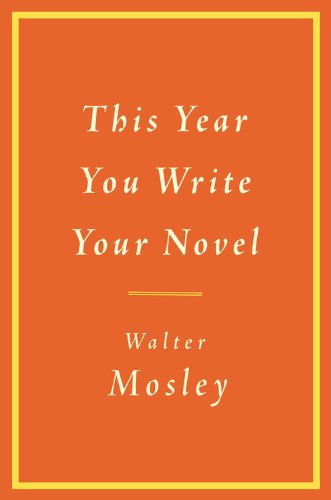14-and-a-Half Pages for the Most Complex Components of Fiction Writing

I've been pretty hard on writing/publishing books. Far too many of them are just garbage. And I've been pretty vocal about the titles that comprise my Mount Rushmore of writing texts. An interesting new addition to the discussion is Walter Mosley's This Year You Write Your Novel.
Clearly Mosley knows what he's talking about. So I was curious to see what he had to say about writing a novel in this slender volume of advice. In the book, Mosley makes some interesting points. One of the suggestions that really jumped out at me (because I'm terribly guilty of this myself) is to refrain from researching a novel.
There will be moments when you will want to dally over details. Do Georgia geese fly south in April or June? Is it physically possible for Bob Millar to hear the cult leader yelling from a mile away--even in a desert. Would the police arrest Trip if the women were allowed into the bar and were served by the owner? All of these questions are valid. Before the book gets into print, you should have the answers. But many writers allow questions like these to help them procrastinate. They tell themselves that they can't go on until these questions are answered. Nonsense. Put a red question mark next to the place where you have questions and get back to it later.
Working at a computer with high-speed Internet access is incredibly tempting for a chronic researcher (like me). It's so easy to say, "I'm just going to look up what size engine a '55 Chevy had," and next thing you know, it's two hours later and you're looking at photos of hand-stitched quilts. So Mosley's advice about researching is something to keep in mind.
I also like the fact that Mosley recognizes two types of writers: intuitive and structured. The intuitive writer meanders through their story, usually unaware of how it will end or how to get there. The structured writer uses outlines and blocking-techniques to plot their novel. Most writing books prescribe one strategy or the other. But Mosley provides useful tips for both types of writers. Which is a great deal more accomodating than many of the writing texts out there.
Ultimately, the biggest positive of the book is also the biggest negative. This Year You Write Your Novel is short. Very short. Ramones-short. Mike Tyson-in-his-prime-putting- people-on-their-ass-in-38-seconds-short. This book covers writing a novel, revising, and trying to get it published in 111 pages. That includes the Introduction and the index. Blink and you might miss something.
For example, Mosley dedicates fourteen-and-a-half pages to a challenging subject. "I'm very happy to be on the other side of having to write about story and plot, the most abstract and complex interconnected components of fiction writing," he writes.
Mosley's advice on getting an agent is even more concise.
How does one get a literary agent?
The best way is through someone who knows and works with that agent. A personal connection is always best. Failing that, you might, in your perusal of bookstores and libraries, have found certain contemporary novels that have a resonance with your own work. Call the publisher of said work and ask who represents that writer. Get the agent's address and send her or him a query letter explaining who you are (a vitae), what you have written, and how that writing echoes work that the agent has represented. In the best of all possible worlds, that agent will ask you for a sample of your book. After that, keep your fingers crossed. Well, geez, that sounds easy, doesn't it?
I will give Mosely a heap of credit for rounding out his brief discussion of agents with the admonition to never work with an agent who charges for their services. Kudos for this warning because far too many beginning writers fall prey to scam artists.
Ultimately, This Year You Write Your Novel is a useful book, probably better suited to the most beginning of writers. Most likely a brand-spanking-new beginner would get bogged down in the detailed discussion some of John Gardner's writing texts. So Mosley's book should be well-calibrated for the person who is just starting this life we have chosen. It should be a handy reference for them as they learn and become ready for more detailed explorations of the craft.

